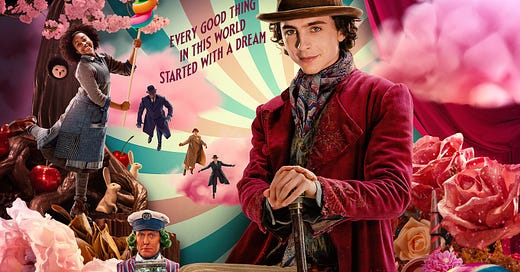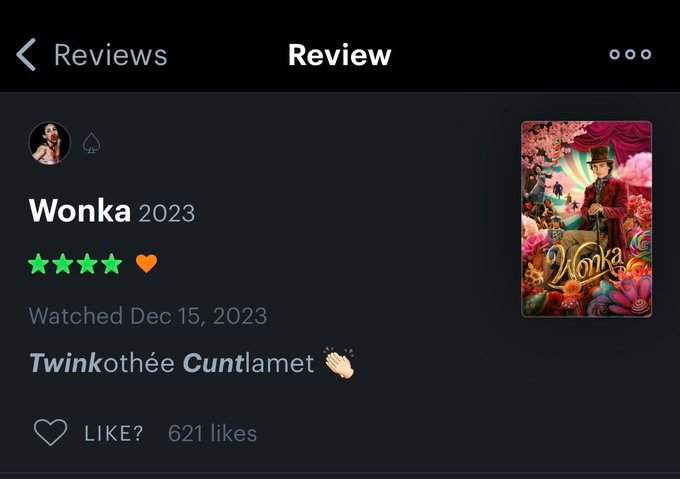Directed by Paul King
Year: 2023
Language: English
Shaun’s Score: 1.7/5 ★
Before Watching:
Hong Sang-soo (one of my favorite Korean directors) recently released a film called Walk Up. Here is a conversation I had over Facebook Messenger audio call (with admittedly poor service):
ME: Wow, Richard Brody1 put Walk Up on his Top 10 Films of 2023 list.
FRIEND: What the hell? Why would he do that?
ME: Well, he’s a prolific director, and Brody typically loves his films—
FRIEND: But Timotheé Chalamet? Oh, come on!
ME: …huh?
FRIEND: He put Wonka on his Top 10 list?!
For the new Willy Wonka & the Chocolate Factory (1971) offshoot, life is like a box of chocolates—you never know what suspiciously positive reviews you’ll find even before your debut. Many of these choco-propaganda bites are likely due to star Timothée Chalamet’s family connections in Hollywood (*cough* and you thought Jamie Lee Curtis was the only nepo baby around? *cough*), but some of them are also explained by the fact that Wonka is somehow not nearly as sloppy as we’d all anticipated. For one thing, the cast—featuring the likes of Keegan-Michael Key, Olivia Colman, The White Lotus’s Natasha Rothwell, and Hugh Grant—is stacked2 like a Twix bar. The costumes, choreography, editing, and effects are also (perhaps unnecessarily) polished; unfortunately, the story itself is bafflingly illogical and hopelessly contrived. All of the original music is a bland mix of the worst melodic motives from Oliver! and Les Miserables, with only the repeat classics from 1971 having any personality. No cute SNL dance sketches can save this production, Timmy.
Chalamet plays a young Willy Wonka on his premiere arrival to an unnamed capital city that evokes London with suspicious accuracy, equipped only with twelve “sovereigns” (the local currency) and a dreadfully plucky attitude “hat-full of dreams.” Of course—as anyone in a modern metropolis like London, New York, or Hong Kong can predict—those twelve sovereigns last only a few minutes, and Willy is soon left to the disingenuous devices of Mrs. Scrubitt (Colman) and her prison-like inn for wayward travelers. Wonka pursues his dream of selling chocolate with a passion typically only reserved for Armie Hammer and peaches, but he is met with resistance from the city’s “cartel” of chocolatiers and their henchman Chief of Police (Key). Wonka must find a way to evade these crooks and distribute his chocolate, while also slipping in enough existing Warner Brothers musical IP to keep audiences awake.
The most disappointing part of the film is how little sense it makes. Baffling plot points come and go without any attempt at explanation, obstacles fall away as effortlessly as they appear, and we only see reasoning once in a blue Dune. How can Willy afford to travel the world and collect chocolate ingredients, but he can’t afford a place to sleep because he’s so easily fleeced out of twelve sovereigns? On such a limited budget, how are they able to transform a barren, dilapidated dump of a shopfront into a crowd-drawing, palatial marvel virtually overnight? I don’t accept “movie magic” as an answer—you’re allowed to set any rules you want in your cinematic universe, but they must be clear and consistent.
Finally, Timothée Chalamet is a peculiar choice for this role. His Wonka is goofy and wide-eyed, brimming with quips and idiosyncrasies that don’t match the character’s canonical mad genius. Where is his reckless disregard for human life, his glimmer of psychosis? A lot has been said about Chalamet—he’s an industry plant, he gave half of NYU chlamydia, you know the rest—but he continues to be pigeonholed into coming-of-age roles that prevent him from branching out as an actor. He’ll be in his mid-40s by the time directors finally cast him as an adult, but at least this time he didn’t have to suffer the humiliation of playing an Oompa Loompa.3
Wonka premiered in London on November 28th, 2023, and is now available in theaters worldwide.
After Watching:
I know, it’s tough to address the Oompa Loompa issue. Clearly our modern moral compasses wince at the idea of unpaid laborers from a foreign land, but they have such a beloved song that the kids demand to hear. King’s Wonka takes a sloppy stab at walking that fine line by suggesting Lofty will be head of the “tasting department” at Willy’s new factory, but it doesn’t quite connect to any version of the factory that we’re familiar with. This is one example of a broader pitfall of adapting Dahl—the film is sticky sweet, but it doesn’t attempt to carve away the ugliness of its source material.4 Even when there’s no Augustus Gloop present, Paul King still makes fat people the butt of the joke with Key’s character.
A few other parts that made no sense. How was Lottie able to spend “all afternoon” finding Noodle’s mother when they only escaped Slugworth’s clutches a few minutes prior? How, when, and with what was Wonka able to build and scale the automated “scrub scrub” machine such that one dog could power an entire day’s work for the full team without Scrubitt and Bleacher noticing? What resources does Willy even have at his disposal with his travel factory that somehow contains “liquid sunlight” and endless power?
More broadly, the film fails from a lack of motivation. It feels like the percentage of films based on recycled IP—sequels, prequels, adaptions, remakes, franchises, etc.—swells higher each year. I worry about an industry that has become so formulaic and lazy that it can’t produce new stories. Unfortunately, we’re not without blame—audiences keep showing up to the box office to chow down on whatever microwaved slosh Kevin Feige or Warner Brothers drops on our plate, bones and all.
For additional context, Richard Brody is the oft-lamented, occasionally brilliant chief film critic of The New Yorker.
Also Phil Wang, who apparently broke his arm in the production process.
I’m sorry Hugh. First that horrific interview, now this?
There are better Roald Dahl adaptions from this year—Wes Anderson recently released four short films based on Dahl stories, which you can find on Netflix.











